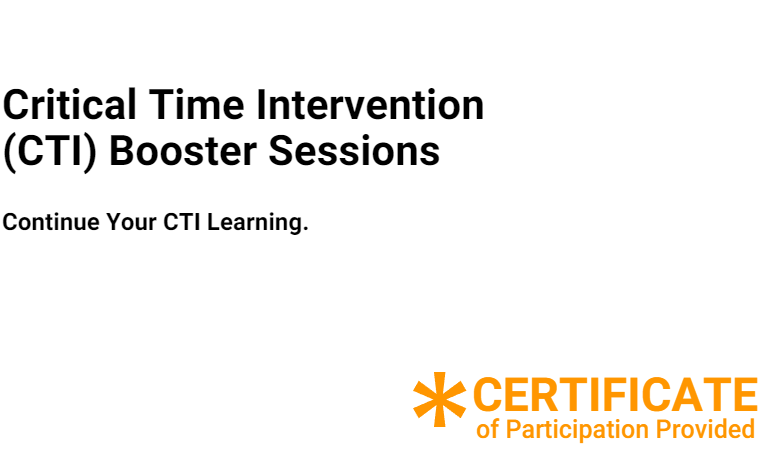|
|
Looking for our last booster session held on June 4th?
Session Title: Implementing CTI for Veterans with Complex Needs Veterans in GPD Case Management programs present with a variety of medical and/or behavioral health issues and conditions. Aging, post-traumatic stress, mental illness, substance use, mobility and visual/auditory impairments create challenges to stabilizing in housing and building a life in the community. This session discusses strategies and resources case managers can use to support Veterans with these complexities to get their needs met and be successful in their homes. |
On-Demand Booster Sessions
Introduction to CTI Booster Sessions - December 6, 2022
Managing the CTI Step-Down Process and Letting Go - March 14, 2023
|
In this session, Suzanne Wagner and Andrea White from Housing Innovations discussed strategies to manage the challenges of the CTI step-down process, including raising expectations for Veterans and the related systems of care. Issues in stepping back and letting go were reviewed, including the role of the case manager and measures of success.
|
Sustaining CTI in Your GPD Aftercare Program - June 6, 2023
|
During this session, Suzanne Wagner and Andrea White of Housing Innovations, reviewed strategies, tools, and resources for sustaining CTI in the GPD Aftercare program. Some GPD Aftercare programs struggle to maintain implementation of CTI over the long term because of staff turnover and/or fluctuations in Veteran caseload. Techniques discussed include creating a “CTI pitch” for new staff and Veterans coming into the GPD program; use of recorded trainings as a resource for supervisors to train GPD staff; and additional tools that reinforce the CTI model. The session also discussed managing Veteran caseloads using the Weighted Caseload Tracker tool and reviewed common challenges in CTI implementation and how to overcome them.
|
Using CTI to Connect Veterans to Housing Options - September 12, 2023
|
This session highlights the Pre-CTI phase, which focuses on helping prepare Veterans for housing. In this phase, the case manager assesses Veterans' housing preferences and needs and works on skill development to help them manage housing and a lease. Connections to resources such as HUD-VASH and other supportive housing options, as well as treatment and supports were reviewed. Managing caseloads using the weighted caseload tracker was also discussed.
|
CTI Overview and Phase Planning - December 5, 2023
|
This session provided a high-level overview of the CTI model with a focus on how Veterans transition through the phases of CTI. Phase Planning and how to use it to help Veterans achieve their goals was highlighted. The session also reviewed "stepping back" as a way to test out the resources, identify and develop new connections, and assess skill development. Finally, issues of staff turnover and the impact on CTI practice were discussed. Case examples were used to highlight concepts presented in the training.
|
Supervision Practices in CTI - March 12, 2024
|
This session highlighted the key role of supervision in the practice of Critical Time Intervention (CTI) to ensure staff had the knowledge and skills to do the work, that best practices were shared and promoted, and that needed resources were accessed. Supervision in CTI includes both the expertise of leadership staff as well as agency structures that support the team’s work. The session reviewed key roles, tasks and tools for CTI supervisors such as clinical supervision, caseload/workload management, and skill-building/problem-solving with staff. Structures to organize and support the work including team meetings, clinical consultation and case reviews were also discussed. Using the CTI Implementation Self-Assessment to prepare for Fidelity Reviews and new resources for QUERI CTI programs were presented. Throughout the session, participants had opportunities to raise examples/questions from their CTI practice.
|
Implementing CTI for Veterans with Complex Needs - June 4, 2024
|
Veterans in GPD Case Management programs present with a variety of medical and/or behavioral health issues and conditions. Aging, post-traumatic stress, mental illness, substance use, mobility and visual/auditory impairments create challenges to stabilizing in housing and building a life in the community.
This session discusses strategies and resources case managers can use to support Veterans with these complexities to get their needs met and be successful in their homes. |
Meet Your Trainers
|
|
Suzanne Wagner, MS, LMSW
Suzanne Wagner is a principal and founder at Housing Innovations (HI), a consulting group that assists organizations to develop and implement effective solutions to homelessness. She has provided training and consultation to hundreds of nonprofit and public agencies to expand their capacity to provide effective services and implement evidence-based practices (EBP’s) proven to end homelessness. She has worked with organizations to implement Critical Time Intervention (CTI), Housing First, Moving On from Supportive Housing (MOSH), and other EBP’s. A member of the Steering Committee of the Center for the Advancement of CTI at the Silberman School of Social Work at CUNY Hunter College, Suzanne has over 30 years of experience in the design of housing programs & services for homeless people, ranging from adolescents and families to single adults with complex needs. Suzanne is a licensed Social Worker. She holds a Master Degree from Columbia University and a Bachelor Degree from Barnard College. Andrea White, MS, LMSW
Andrea White has 30 years of experience providing programs to the most vulnerable homeless individuals and families. As a service provider in shelters in NYC in the 1980s, Andrea worked in close cooperation with researchers from Columbia University in the initial development of the CTI Model. She worked on the SAMHSA toolkit for Permanent Supportive Housing and participated in the development of the Safe Haven model and contributed to the Safe Haven Manual. Using lessons learned from her experience in street outreach, shelter, transitional housing, and permanent supportive housing projects, Andrea has provided training and technical assistance to look at the system of care for homeless people and people with disabilities. Andrea has worked with the Veterans Administration for the HUD VASH program, including tribal HUD-VASH and provided video sessions, web based training, on-site training, technical assistance, the development of the HUD VASH Resource Guide, and presented at numerous conferences. She has also provided technical and program design assistance with new initiatives such as the Rapid Re-housing Program and the Covid 19 Response efforts. |







